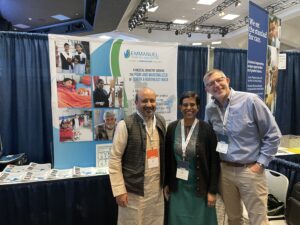A Passion for Medical Missions

Conference challenges a new generation to put faith in action and serve the poor
Serving the poor of North India, EHA is part of a bigger global medical mission movement. That’s why we make it a point to participate in significant conferences designed to highlight the work done around the world. One such annual medical mission gathering in November is the three-day Global Missions Health Conference (GMHC) held in Louisville, KY.
The GMHC calls young medical professionals-in-training to consider serving the global poor. Thankfully, many have this vision and see themselves investing in medical work in difficult places. At the GMHC, presentations from frontline practitioners put a spotlight on critical needs which must be addressed, and bluntly chronicle the realities of serving day in and day out. Plenary sessions feature inspirational music and messages which vividly outline the need for more medical missions, and foster increased commitment from attendees. A range of medical mission personnel currently serving across Africa, Asia, and Central/South America make a point to be there, as do medical students considering future service. Young people can learn from veterans, and can explore opportunities for long-term placement, as well as medical residency options which fit future plans.
EHA’s head of palliative care, Dr. Ashita Singh, had an opportunity to present on our efforts in caring for suffering patients and the impact the work has on so many. She detailed EHA’s strategies to extend end-of-life assistance in rural north India, where it is virtually unknown. Launched more than a decade ago by veteran medical missionary Dr. Ann Thyle, the palliative program now touches patients and their families at all 19 of EHA’s locations. The model features home-based care by teams sent from the hospitals, and they served more than 2,000 patients last year, through 11,000 home visits. All told, the program touched the lives of some 50,000 people, many of them poor and marginalized with very limited access to quality healthcare of any kind, let alone palliative assistance.
As the EHA teams visit patients, they have opportunities to build relationships with family members and others in villages, bringing much-needed education about sickness and disease, and how to care for those in great suffering. Staff provide relief for patients who otherwise would be left to suffer and die alone and in agony. The default view of family members is that cancers and other life-limiting illnesses are untreatable and possibly contagious. Many are shocked that care is possible and available. What greater testimony of God’s love could be imagined than to bring this kind of help to those in such difficulty.
If your heart is particularly moved by what EHA is doing in palliative care, take time regularly to pray for the work. Beyond this, those with a particular interest in this arena are welcome to visit EHA and observe our palliative care efforts on the front-lines. This kind of experience could change your life! And of course, your help funding these efforts, which by their nature require constant support, would be most appreciated.
